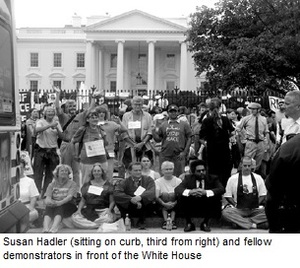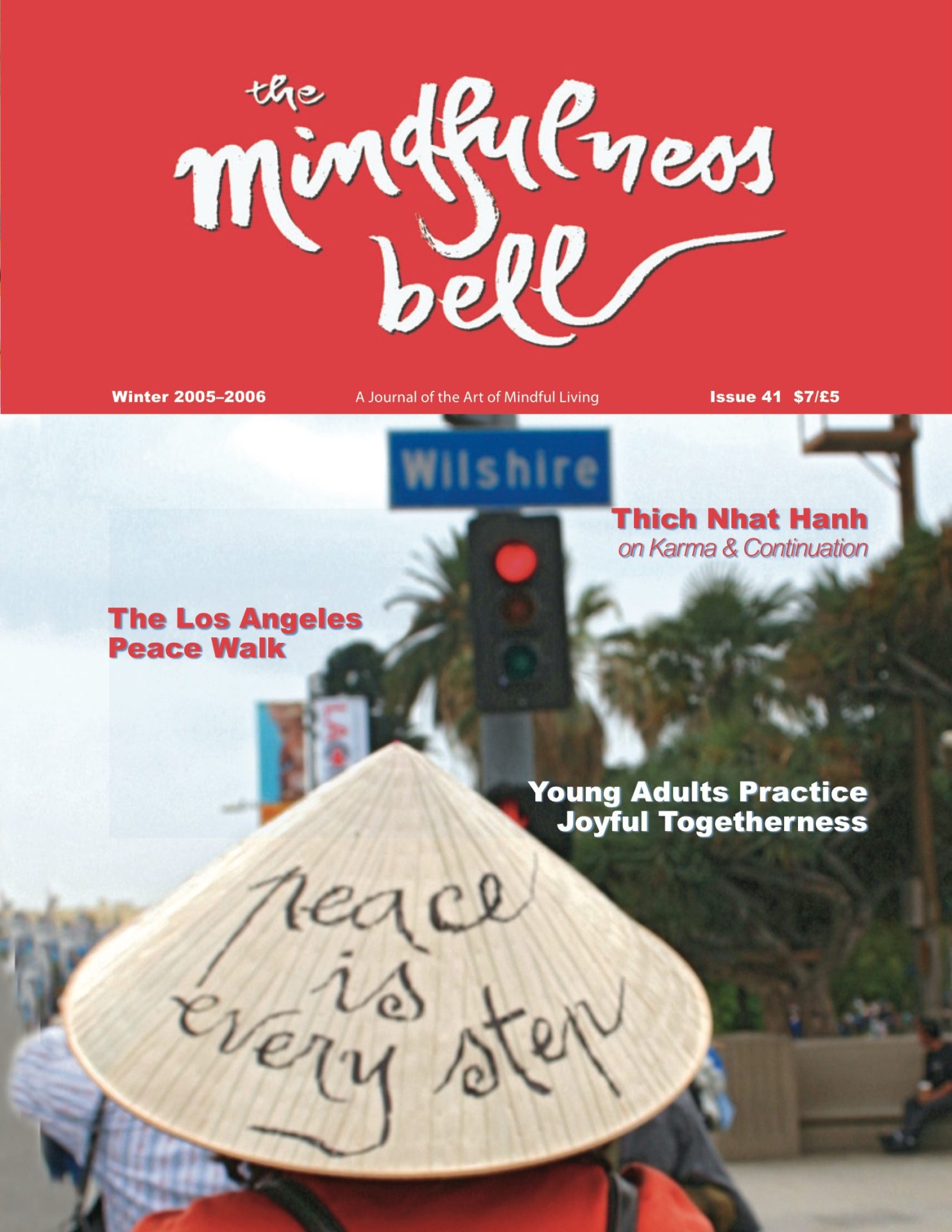
By Susan Hadler
On September 24, 2005, approximately 200,000 people gathered in Washington, D.C. to demand an end to the war in Iraq. People clustered into various affinity groups including the Buddhist one that Sangha member Susan Hadler joined.
We sang as we walked down Sixteenth Street towards the White House, “Peace, Salaam, Shalom.” I sang to Abdullah Abdul-Majeed Al-Shadoon, wearing his name on a tag around my neck,

By Susan Hadler
On September 24, 2005, approximately 200,000 people gathered in Washington, D.C. to demand an end to the war in Iraq. People clustered into various affinity groups including the Buddhist one that Sangha member Susan Hadler joined.
We sang as we walked down Sixteenth Street towards the White House, “Peace, Salaam, Shalom.” I sang to Abdullah Abdul-Majeed Al-Shadoon, wearing his name on a tag around my neck, given to me at the church where we gathered before the march. Abdullah Abdul-Majeed Al-Shadoon was twenty-six years old when he died on April 22, 2003. A beloved son, a brother, a friend, maybe a father. I also sang to my father who was twenty five when he died in April 1945 in World War II when I was an infant. I sang with the mothers and fathers walking with us whose children were killed recently in Iraq and Afghanistan.
We walked together with our knowledge of war and our message of peace: clergy and laypeople of all faiths, Code Pink women, anarchists dressed in black, Buddhist monks accompanying our steps with drums, brothers and sisters coming from Alaska to Florida. I walked with the Buddhist affinity group, thankful to be part of a community practicing walking, singing, sitting, and breathing peace. We walked with the larger Sangha, gathered to hold in mind and heart the names of all the dead in the war on Iraq and to present those names with a letter to President Bush as a plea to end the killing and to use our resources for helping people live.
We sat in front of the White House, peacefully and joyfully sharing food and water. We did not move when the police told us to leave. The police picked up Cindy Sheehan, whose son was killed in Iraq, and carried her to a paddy wagon. She was smiling. They arrested people in batches, handcuffed them, put them into paddy wagons, and drove off. We sat on the curb and sang peace songs to Mr. Bush and the White House and Congress and to each other. Walking. Sitting. Singing. Smiling. Our practice nourished us and gave us strength. The atmosphere within and around us was peaceful, dedicated, generous.
Prisoner 5-168
Our turn came. Our Buddhist affinity group stood in a row, each with a hand on the shoulder of the person in front. When it was my turn I smiled and bowed to the young police officer, turning as he attached the handcuffs. As prisoner 5-168, I entered a DC Metro bus borrowed from the city due to the unexpectedly large number of people being arrested, 374 in all. A police escort led the bus to the park police headquarters in Anacostia.
Our bus was our jail cell for about ten hours. We were a joyful group of forty-eight women of all ages and colors, singing, talking, sharing stories. Those who could scratched the noses of those who couldn’t, as we worked to wriggle out of our handcuffs. The young police officer assigned to us tried to be tough but ended up becoming our friend. As time went on my slight headache worsened and I lay down on the back seat, a woman sharing her pillow with me. I followed my breath in and out, and I felt Thay’s presence, reminding us to keep breathing. He knew where we were and I felt his prayers and energy. I began to relax.
About one p.m., we were led inside a garage split into two rooms by a chainlink fence, women on one side, men on the other. Sangha sister Roberta and I began doing mindful movements and a circle formed. As the outside doors closed, we knew we were locked up in a filthy, greasy place, but our minds were free and we were able to help each other stay calm. Often during that night and since then I have sent love and courage to those who are imprisoned.
We Are Free
Finally the police called our numbers to be processed. Inside the police headquarters more information was taken and for a short time we were put into tiny dirty cells, about seven to a cell. Called by number for fingerprinting and photographing, we were then given back our names and our property.
I looked out the door into the four a.m. night and saw a taxi waiting, and Maia and Bob of the Buddhist Peace Fellowship welcoming us. Our taxi driver was a South African who had been arrested many times in his country’s efforts toward liberation.
Because we were a Sangha and because we practiced, we were peace and we were free and we were home every step of the way.
Susan Hadler, Transformational Light of the Heart, lives in Alexandria, Virginia. This was her first arrest.

